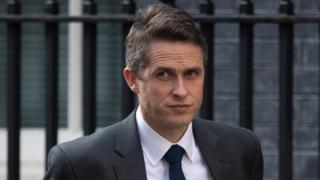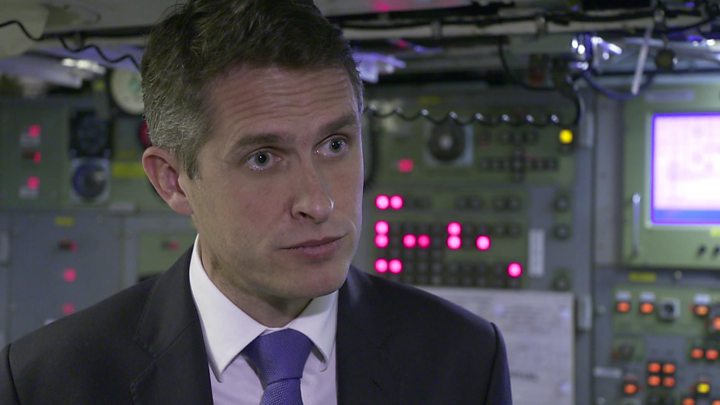Gavin Williamson sacking: Former defence secretary denies Huawei leak
 Image copyright EPA
Image copyright EPA Gavin Williamson has strenuously denied he leaked information from the National Security Council as calls are being made for a police inquiry.
He was sacked as defence secretary for allegedly disclosing plans to allow Chinese telecoms giant Huawei to help build the UK’s 5G network.
Opposition MPs said there should be an investigation into whether the Official Secrets Act had been breached.
Downing Street said it had “compelling evidence” and the matter was closed.
Mr Williamson is quoted in several of Thursday’s newspapers as saying he was the victim of a “vendetta” and a “kangaroo court”.
He told Sky News that he “swore on his children’s lives” that he was not responsible for the leak.
He also cited poor relations with Sir Mark Sedwill, the Cabinet Secretary and National Security Adviser, who carried out the leak investigation, telling the Times he would have had been “absolutely exonerated” had police probed what went on after the NSC meeting.
The inquiry into the leak began after the Daily Telegraph reported on the council’s confidential discussions – including warnings from several cabinet members about possible risks to national security over a deal with Huawei.
At a meeting with Mr Williamson on Wednesday evening, Theresa May told him she had information that suggested that he was responsible for the unauthorised disclosure.
In a letter confirming his dismissal, she said: “No other credible version of events to explain this leak has been identified.”
In response, Mr Williamson – defence secretary since 2017 – wrote he was “confident” that a “thorough and formal inquiry” would have “vindicated” his position.
“I appreciate you offering me the option to resign, but to resign would have been to accept that I, my civil servants, my military advisers or my staff were responsible: this was not the case,” he said.
BBC political editor Laura Kuenssberg said sources close to the former defence secretary had told her Mr Williamson did meet the Daily Telegraph’s deputy political editor, Steven Swinford, but “that absolutely does not prove” he leaked the story to him.
Labour deputy leader Tom Watson told BBC Radio 4’s Today programme that Mr Williamson has “a right to clear his name” and the best way to do that is through a criminal inquiry.
He said: “This is about the law applying equally to everyone. We have had very high profile civil servants going to jail for breaching the Official Secrets Act.”
Downing Street has made a very serious accusation and is sure enough to carry out this sacking.
For the prime minister’s allies, it will show that she is, despite the political turmoil, still strong enough to move some of her ministers around – to hire and fire.
Mr Williamson is strenuously still denying that the leak was anything to do with him at all.
There is nothing fond, or anything conciliatory, in either the letter from the prime minister to him, or his reply back to her.
Former national security adviser Lord Ricketts, a crossbench peer, told the BBC’s Newsnight programme that on the face of it, the leak was a breach of the act and police ought to be considering an inquiry.
The Liberal Democrats said its deputy leader Jo Swinson has written to the Metropolitan Police Commissioner calling for a criminal investigation “to ascertain whether the actions of Mr Williamson constitute a breach”.
Scotland Yard said in a statement that it was a matter for the National Security Council and the Cabinet Office, and it was not carrying out an investigation.

Media playback is unsupported on your device
“Clearly, if at any stage we receive any information that would suggest criminal offences have been committed, then we will look into that,” it added.
But former head of the civil service Gus O’Donnell told Today that the cabinet secretary had advised the prime minister that the leak was a breach of the ministerial code and not a breach of the Official Secrets Act, saying: “That is why it is a matter for the prime minister.”
Former Army chief Lord Dannatt told Today that the sacking was a “personal tragedy” for Mr Williamson, but also “very upsetting” for defence.
He said Mr Williamson had worked “very hard” for defence in trying to get more resources.
The National Security Council is made up of senior cabinet ministers and its weekly meetings are chaired by the prime minister, with other ministers, officials and senior figures from the armed forces and intelligence agencies invited when needed.
It is a forum where secret intelligence can be shared by GCHQ, MI6 and MI5 with ministers, all of whom have signed the Official Secrets Act.
There has been no formal confirmation of Huawei’s role in the 5G network and No 10 said a final decision would be made at the end of spring.
The US has been campaigning hard among allies to exclude the Chinese telecoms giant Huawei from delivering 5G, because of its security concerns.
Huawei has denied there is any risk of spying or sabotage, or that it is controlled by the Chinese government.
Penny Mordaunt has taken over as defence secretary – the first woman in the role – and prisons minister Rory Stewart is replacing her as international development secretary.
How damaging was the Huawei leak?
By BBC security correspondent Gordon Corera
Sources maintain damage has been done by the leak.
It was not of the most sensitive possible information. That would be details of intelligence sources and methods.
A leak in Washington a few years ago pointed to the fact that there was an agent inside a group planning attacks on the West from Yemen. That put the agent’s life at risk and compromised a valuable stream of intelligence.
The Huawei leak related to a policy decision. But the damage lies in relations with allies.
The US has been campaigning hard for Huawei to be excluded from new 5G networks.
The leak may not have fully captured the restrictions to be placed on the company even though its role was approved. And because the decision was leaked within hours of the meeting ending, there was no chance to explain the decision to Washington.
The day the leak appeared, a senior official from America’s National Security Agency spy agency spoke to me to reiterate Washington’s concerns and days later a State Department official told me that the US would have to re-evaluate information sharing with allies that used Huawei.
That official also came to London to continue the push. And so the frustration from UK officials is that their ability to explain the policy to the public and to allies was compromised by the speed and substance of what was revealed.




